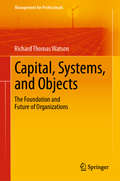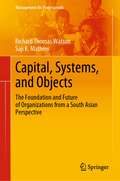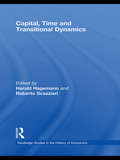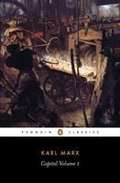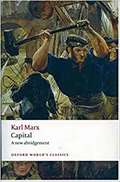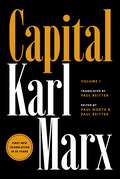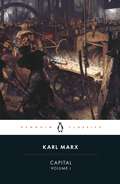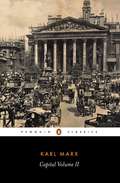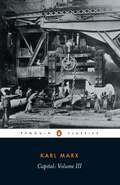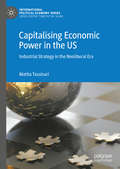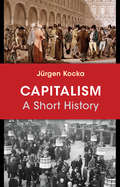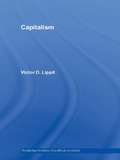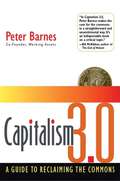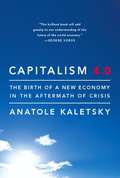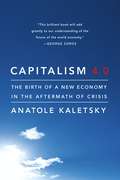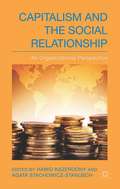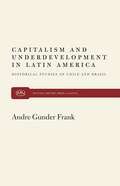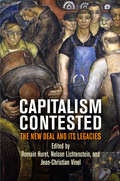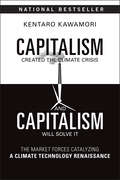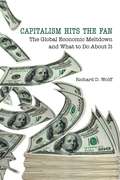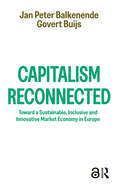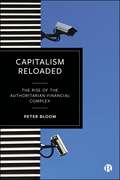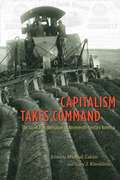- Table View
- List View
Capital, Systems, and Objects: The Foundation and Future of Organizations (Management for Professionals)
by Richard Thomas WatsonThis book provides a set of integrated frameworks—capital, systems, and objects—that transcend managerial or technology hype by focusing on the long-term fundamentals that sustain organizational success. Many organizations are currently addressing two important transformational issues: ecological sustainability and digitization. Sustainability is a goal, an end, and digitization is a process, a means to achieve a goal. This book introduces a flexible model that can be applied to current and future organizational challenges, including sustainability and digitization, because the fundamentals are constant. This book is designed to serve two purposes for the readers: first, to present three conceptual foundations for designing and operating organizations (capital, systems, and objects in Part I); and second, to provide a reference source for implementing these ideas in an organization (Parts II and III). The Part I of the book, chapters 1 through 7, sets forth the conceptual foundations. The chapters mix concepts and practical examples to give a new way of thinking about the setting in which one may work many days each year. The Part II provides details and associated examples of every one of the thirty-six forms of capital conversion. It also illustrates how the five foundational systems support capital conversion in a variety of ways. Finally, the Part III is about measuring capital and systems. The book will resonate with practitioners and students of strategy, leadership, and organizational design. It is critical reading for leaders, industry experts, and general readers who want to understand how over thousands of years the capital creation system has developed today’s world and will fashion its future.
Capital, Systems, and Objects: The Foundation and Future of Organizations from a South Asian Perspective (Management for Professionals)
by Richard Thomas Watson Saji K. MathewThis book provides a set of integrated frameworks—capital, systems, and objects—that transcend managerial or technology hype by focusing on the long-term fundamentals that sustain organizational success, and it contains cases from South East Asia to elaborate this concept. Many organizations are currently addressing two important transformational issues: ecological sustainability and digitization. Sustainability is a goal, an end, and digitization is a process, a means to achieve a goal. This book introduces a flexible model that can be applied to current and future organizational challenges, including sustainability and digitization, because the fundamentals are constant.This book is designed to serve two purposes for the readers: first, to present three conceptual foundations for designing and operating organizations (capital, systems, and objects (section 1)); and second, to provide a reference source for implementing these ideas in your organization (sections 2 and 3). The first section of the book, chapters 1 through 7, sets forth the conceptual foundations. The chapters mix concepts and practical examples to give a new way of thinking about the setting in which one may work many days each year. The second section provides details and associated examples of every one of the thirty-six forms of capital conversion. It also illustrates how the five foundational systems support capital conversion in a variety of ways. Finally, the third section is about measuring capital and systems.The book covers measurement of all types of capital and systems performance and has been written for current and future organizational leaders to change the game and play it more effectively. The book will thus resonate with students of organizational behaviour and leadership strategy, organizational leaders, industry experts, and general readers.
Capital, Time and Transitional Dynamics (Routledge Studies in the History of Economics #Vol. 96)
by Roberto Scazzieri Harald HagemannIn the words of Robert M. Solow traverse analysis "is the easiest part of skiing, but the hardest part of economics". The aim of this volume is to assess the state and scope of modern traverse analysis as it had been initiated by John Hicks in his pioneering contribution Capital and Time (1973). The analysis of an economy which originally had been in a growth equilibrium which was disturbed by technical progress is one of the most challenging problems in economics. This book takes Hicks’ work as the point of departure for theoretical work on the macroeconomic theory of capital dynamics along transition non-steady state paths The original contributions in this volume explore the manifold theoretical roots of traverse analysis in classical and post-classical literature, its features as a specific method of economic dynamics, and its applications in a variety of fields from monetary economics to development and international economics. The essays thereby focus on the ways ahead from Capital and Time that have been suggested and actively pursued by a number of scholars in recent years. Its central theme is the role of capital structures as critical factors in determining the actual dynamics of any given economic system. This volume is inspired by the belief that this state of affairs is not a satisfactory one, and outlines a new agenda for capital theory. Contributors include Edwin Burmeister, Jean-Luc Gaffard and Heinz Kurz.
Capital: A Critique Of Political Economy
by Karl Marx Ernest Mandel Ben FowkesOne of the most notorious works of modern times, as well as one of the most influential, Capital is an incisive critique of private property and the social relations it generates. Living in exile in England, where this work was largely written, Marx drew on a wide-ranging knowledge of its society to support his analysis and generate fresh insights. Arguing that capitalism would create an ever-increasing division in wealth and welfare, he predicted its abolition and replacement by a system with common ownership of the means of production. Capital rapidly acquired readership among the leaders of social democratic parties, particularly in Russia and Germany, and ultimately throughout the world, to become a work described by Marx's friend and collaborator Friedrich Engels as 'the Bible of the Working Class.'
Capital: An Abridged Edition (Oxford World's Classics)
by Karl Marx David McLellanA classic of early modernism, Capital combines vivid historical detail with economic analysis to produce a bitter denunciation of mid-Victorian capitalist society. It has proved to be the most influential work in twentieth-century social science; Marx did for social science what Darwin had done for biology. This is the only abridged edition to take into account the whole of Capital. It offers virtually all of Volume 1, which Marx himself published in 1867; excerpts from a new translation of "The Result of the Immediate Process Production"; and a selection of key chapters from Volume 3, which Engels published in 1895. About the Series: For over 100 years Oxford World's Classics has made available the broadest spectrum of literature from around the globe. Each affordable volume reflects Oxford's commitment to scholarship, providing the most accurate text plus a wealth of other valuable features, including expert introductions by leading authorities, voluminous notes to clarify the text, up-to-date bibliographies for further study, and much more.
Capital: Critique of Political Economy, Volume 1
by Karl MarxMarx for the twenty-first centuryThe first new English translation in fifty years—and the only one based on the last German edition revised by Marx himselfFeaturing extensive original commentary, including a foreword by acclaimed political theorist Wendy Brown&“An astounding achievement.&”—China Miéville, author of October: The Story of the Russian RevolutionKarl Marx (1818–1883) was living in exile in England when he embarked on an ambitious, multivolume critique of the capitalist system of production. Though only the first volume saw publication in Marx&’s lifetime, it would become one of the most consequential books in history. This magnificent new edition of Capital is a translation of Marx for the twenty-first century. It is the first translation into English to be based on the last German edition revised by Marx himself, the only version that can be called authoritative, and it features extensive commentary and annotations by Paul North and Paul Reitter that draw on the latest scholarship and provide invaluable perspective on the book and its complicated legacy. At once precise and boldly readable, this translation captures the momentous scale and sweep of Marx&’s thought while recovering the elegance and humor of the original source.For Marx, our global economic system is relentlessly driven by &“value&”—to produce it, capture it, trade it, and, most of all, to increase it. Lifespans are shortened under the demand for ever-greater value. Days are lengthened, work is intensified, and the division of labor deepens until it leaves two classes, owners and workers, in constant struggle for life and livelihood. In Capital, Marx reveals how value came to tyrannize our world, and how the history of capital is a chronicle of bloodshed, colonization, and enslavement.With a foreword by Wendy Brown and an afterword by William Clare Roberts, this is a critical edition of Capital for our time, one that faithfully preserves the vitality and directness of Marx&’s German prose and renders his ideas newly relevant to modern readers.
Capital: Volume I (Capital #1)
by Karl Marx'A groundbreaking work of economic analysis. It is also a literary masterpice' Francis Wheen, GuardianOne of the most notorious and influential works of modern times, Capital is an incisive critique of private property and the social relations it generates. Living in exile in England, where this work was largely written, Marx drew on a wide-ranging knowledge of its society to support his analysis. Arguing that capitalism would cause an ever-increasing division in wealth and welfare, he predicted its abolition and replacement by a system with common ownership of the means of production. Capital rapidly acquired readership throughout the world, to become a work described by Marx's collaborator Friedrich Engels as 'the Bible of the working class'.Translated by BEN FOWKES with an Introduction by ERNEST MANDEL
Capital: Volume II (Capital #2)
by Karl MarxThe "forgotten" second volume of Capital, Marx's world-shaking analysis of economics, politics, and history, contains the vital discussion of commodity, the cornerstone to Marx's theories.
Capital: Volume III (Capital #3)
by Karl MarxUnfinished at the time of Marx's death in 1883 and first published with a preface by Frederick Engels in 1894, the third volume of Das Kapital strove to combine the theories and concepts of the two previous volumes in order to prove conclusively that capitalism is inherently unworkable as a permanent system for society. Here, Marx asserts controversially that - regardless of the efforts of individual capitalists, public authorities or even generous philanthropists - any market economy is inevitably doomed to endure a series of worsening, explosive crises leading finally to complete collapse. But healso offers an inspirational and compelling prediction: that the end of capitalism will culminate, ultimately, in the birth of a far greater form of society.
Capitalising Economic Power in the US: Industrial Strategy In The Neoliberal Era (International Political Economy Ser)
by Mattia TassinariThis book examines the American industrial strategy, from the late 70s to the present day, in what is now known as the ‘neoliberal era’. The author illustrates the ways in which the protection and promotion of American companies and industries took place in the context of the international ‘free market’. He provides clear evidence of how the economic power of the United States – wielded to influence the formal and informal institutions of the neoliberal order – has been used as a tool for enhancing its competitive advantage against other world economies.
Capitalism
by Jürgen KockaIn this book, one of the world's most renowned historians provides a concise and comprehensive history of capitalism within a global perspective from its medieval origins to the 2008 financial crisis and beyond. From early commercial capitalism in the Arab world, China, and Europe, to nineteenth- and twentieth-century industrialization, to today's globalized financial capitalism, Jürgen Kocka offers an unmatched account of capitalism, one that weighs its great achievements against its great costs, crises, and failures. Based on intensive research, the book puts the rise of capitalist economies in social, political, and cultural context, and shows how their current problems and foreseeable future are connected to a long history.Sweeping in scope, the book describes how capitalist expansion was connected to colonialism; how industrialism brought unprecedented innovation, growth, and prosperity but also increasing inequality; and how managerialism, financialization, and globalization later changed the face of capitalism. The book also addresses the idea of capitalism in the work of thinkers such as Marx, Weber, and Schumpeter, and chronicles how criticism of capitalism is as old as capitalism itself, fed by its persistent contradictions and recurrent emergencies.Authoritative and accessible, Capitalism is an enlightening account of a force that has shaped the modern world like few others.
Capitalism (Routledge Frontiers of Political Economy #Vol. 71)
by Victor D. LippitThis imaginative and ambitious book rethinks the nature of capitalism. Lippit, a leading heterodox economist in the USA, here delivers a comparative study of different forms of capitalism. He first critically examines the three main capitalist prototypes: * the Anglo-American, market-driven version* the welfare-state capitalism of continental Europe* the state-led capitalism of East Asia. After investigating their various intricacies, he then goes on to analyze the common weaknesses of each different strand. A provocative and stimulating read, this book will be welcomed by postgraduates and professionals in the fields of economics and political economy.
Capitalism 3.0: A Guide to Reclaiming the Commons
by Peter BarnesThe commons — those creations of nature and society we inherit together and must preserve for our children — is under siege. Our current version of capitalism — the corporate, globalized version 2.0 — is rapidly squandering this heritage. Now, Peter Barnes offers a solution: protect the commons by giving it property rights and strong institutional managers. Barnes shows how capitalism — like a computer — is run by an operating system. Our current operating system gives too much power to profit-maximizing corporations that devour the commons and distribute most of their profits to a sliver of the population. And government — which in theory should defend the commons — is all too often a tool of those very corporations. Barnes proposes a revised operating system — Capitalism 3.0 — that protects the commons while preserving the many strengths of capitalism as we know it. His major innovation is the commons trust, a market based legal entity with the power to limit the use of scare commons, charge rent, and pay dividends — in both cash and services — to everyone. In Barnes' vision, an array of commons trusts would institutionalize our obligations to future generations, fellow citizens, and nature. Once established, they'd use markets and property rights to create a better world for us all. Capitalism 3.0 offers a practical alternative to our current flawed economic system. It points the way to a future in which we can retain capitalism's virtues while mitigating its vices.
Capitalism 4.0
by Anatole KaletskyIn early 2009, many economists, financiers, and media pundits were confidently predicting the end of the American-led capitalism that has shaped history and economics for the past 100 years. Yet the U.S. economic model, far from being discredited, may be strengthened by the financial crisis.In this provocative book, Anatole Kaletsky re-interprets the financial crisis as part of an evolutionary process inherent to the nature of democratic capitalism. Capitalism, he argues, is resilient. Its first form, Capitalism 1.0, was the classical laissez-faire capitalism that lasted from 1776 until 1930. Next was Capitalism 2.0, New Deal Keynesian social capitalism created in the 1930s and extinguished in the 1970s. Its last mutation, Reagan-Thatcher market fundamentalism, culminated in the financially-dominated globalization of the past decade and triggered the recession of 2009-10. The self-destruction of Capitalism 3.0 leaves the field open for the next phase of capitalism's evolution. Capitalism is likely to transform in the coming decades into something different both from the totally deregulated market fundamentalism of Reagan/Thatcher and from the Roosevelt-Kennedy era. This is Capitalism 4.0.
Capitalism 4.0
by Anatole KaletskyThe global financial crisis of 2007 to 2009 ruined businesses and banks, individuals and even nations, and seemed to land a mortal blow to the capitalist system. But capitalism was not destroyed, rather it was irrevocably altered: the forces that precipitated the crisis are now contributing to the evolution of a new, stronger version of the capitalist model. Tracing the development of capitalism from the late eighteenth century through three distinct historical phases, Kaletsky shows how at each of these transitions the existing economic order appeared to be fatally threatened, only for capitalism to reinvent itself and emerge stronger than before. The turning point for our most recent age of capitalism came on 15 September 2008 when Lehman Brothers collapsed, setting off market chaos which, had it not been for government bailouts and guarantees, would have toppled every bank in the Western world, an incident which set off the fourth major systemic transformation in capitalism's history - Capitalism 4. 0. Understanding Capitalism 4. 0 will be critical to the continued recovery of our global economies. In this controversial and wide-ranging book, Anatole Kaletsky, one of the world's foremost economic commentators, puts recent financial events into historical and ideological perspective. He describes the emerging features of this new capitalist model, explains how it differs from the previous versions - and how it will change politics, finance, international relations and economic thinking in the next decade.
Capitalism 4.0: The Birth of a New Economy in the Aftermath of Crisis
by Anatole KaletskyIn this controversial book, Anatole Kaletsky puts the upheavals of 2007-2009 in historical and ideological perspective. He shows how the forces that precipitated the financial meltdown are now creating a new and stronger version of the global capitalist system-- one that will continue to be led and shaped by the U. S. if its businesses and politicians play their cards well. This is Capitalism 4. 0, and it will change politics, finance, international relations, and economic thinking in the coming decades.
Capitalism And The Social Relationship
by Agata Stachowicz-Stanusch Hamid KazeroonyThe book examines the changing external environment of organizations. This book explores the contradictions within the global capitalist system and their consequences to assess and find ways in creating new knowledge for managers/leaders to reorient themselves in appropriate restructuring of organizations to better serve their stakeholders.
Capitalism And Underdevelopment In Latin America
by Andre Gunder FrankThe four essays in this book offer a sweeping reinterpretation of Latin American history as an aspect of the world-wide spread of capitalism in its commercial and industrial phases. Dr. Frank lays to rest the myth of Latin American feudalism, demonstrating in the process the impossibility of a bourgeois revolution in a part of the world which is already part and parcel of the capitalist system.
Capitalism Contested: The New Deal and Its Legacies
by Romain Huret, Nelson Lichtenstein, and Jean-Christian VinelIn the historical narrative that prevails today, the New Deal years are positioned between two equally despised Gilded Ages—the first in the late nineteenth century and the second characterized by the world of Walmart, globalization, and right-wing populism in which we currently live. What defines these two ages is an increasing level of inequality legitimized by powerful ideologies, namely, Social Darwinism at the end of the nineteenth century and neoliberalism today. In stark contrast, the era of the New Deal was first and foremost an attempt to put an end to inequality in American society. In the historical longue durée, it appears today as a kind of golden age when policymakers and citizens sought to devise solutions to the two major "questions"—labor on one side, social on the other—that were at the heart of the American political economy during the twentieth century.Capitalism Contested argues that the New Deal order remains an effective framework to make sense of the transformation of American political economy over the last hundred years. Contributors offer an historicized analysis of the degree to which that political, economic, and ideological order persists and the ways in which it has been transcended or even overthrown. The essays pay attention not only to those ideas and social forces hostile to the New Deal, but to the contradictions and debilities that were present at the inauguration or became inherent within this liberal impulse during the last half of the twentieth century. The unifying thematic among the essays consists not in their subject matter—politics, political economy, social thought, and legal scholarship are represented—but in a historical quest to assess the transformation and fate of an economic and policy order nearly a century after its creation.Contributors: Kate Andrias, Romain Huret, William P. Jones, Nelson Lichtenstein, Nancy MacLean, Isaac William Martin, Margaret O'Mara, K. Sabeel Rahman, Timothy Shenk, Elizabeth Tandy Shermer, Jason Scott Smith, Samir Sonti, Karen M. Tani, Jean-Christian Vinel.
Capitalism Created the Climate Crisis and Capitalism Will Solve It: The Market Forces Catalyzing a Climate Technology Renaissance
by Kentaro KawamoriCreative and practical free-market solutions to climate change In Capitalism Created the Climate Crisis and Capitalism Will Solve It: The Market Forces Catalyzing a Climate Technology Renaissance, distinguished author Kentaro Kawamori delivers a fascinating and timely exploration of the interplay between capitalism and climate change. He explains how the capitalist system helped to contribute to the current crisis of global warming and how that same system will help to end it. In the book, the author discusses the enormous impact of the climate crisis and how the government, the modern finance industry, the fossil fuel industry, and others combined to accelerate the warming of the world. He then considers the roles those same players will play to reverse this effect in the coming years. You’ll also find: Discussions of how climate tech innovations will transform the economy and how technology disruptors will become involved in the process The ways the energy industry will change to incorporate the realities and consequences of a warming climate Explorations of the incentives created by free market structures and how to include climate stakeholders in the discussionAn engaging and exciting new resource for anyone interested in the intersection of economics, business, and the environment, Capitalism Created the Climate Crisis and Capitalism Will Solve It contains practical and thoughtful climate prescriptions for a world desperately in need of them.
Capitalism Hits the Fan: The Global Economic Meltdown and What to Do About It
by Richard D. WolffA breathtakingly clear analysis that breaks down the root causes of today's economic crisis"With unerring coherence and unequaled breadth of knowledge, Rick Wolff offers a rich and much needed corrective to the views of mainstream economists and pundits. It would be difficult to come away from this... with anything but an acute appreciation of what is needed to get us out of this mess."--Stanley Aronowitz, Distinguished Professor of Sociology and Urban Education, City University of New YorkCapitalism Hits the Fan chronicles one economist's growing alarm and insights as he watched, from 2005 onwards, the economic crisis build, burst, and then change the world. The argument here differs sharply from most other explanations offered by politicians, media commentators, and other academics. Step by step, Professor Wolff shows that deep economic structures-the relationship of wages to profits, of workers to boards of directors, and of debts to income-account for the crisis. The great change in the US economy since the 1970s, as employers stopped the historic rise in US workers' real wages, set in motion the events that eventually broke the world economy. The crisis resulted from the post-1970s profit explosion, the debt-driven finance-industry expansion, and the sequential stock market and real estate booms and busts. Bailout interventions by the Federal Reserve and the US Treasury have thrown too little money too late at a problem that requires more than money to solve.As this book shows, we must now ask basic questions about capitalism as a system that has now convulsed the world economy into two great depressions in 75 years (and countless lesser crises, recession, and cycles in between). The book's essays engage the long-overdue public discussion about capitalism as a system and about the basic structural changes needed not only to fix today's broken economy but to prevent future crises.Richard Wolff has been a professor of economics at the University of Massachusetts, Amherst since 1981. He has been a visiting professor in the Graduate Program in International Affairs, at the New School in New York since 2007. Wolff's major recent interests and publications include studies of US economic history to ascertain the basic structural causes of the current economic crisis and the examination of how alternative economic theories (neoclassical, Keynesian, and Marxian) understand and respond to the crisis in very different ways. His past work involves application of advanced class analysis to contemporary global capitalism. He has written, co-authored, and co-edited many books and dozens of scholarly and popular journal articles. His recent analyses of current economic events appear regularly in the webzine of the Monthly Review. In 2009, Capitalism Hits the Fan, the documentary on the current economic crisis, was released by Media Education Foundation (www.mediaed.org). Visit http://www.rdwolff.com for more information.Abridged Table of Contents:IntroductionPart I: Roots of a System's CrisisPart II: The Economics of Crisis1 Capitalism as a Crisis-Prone System2 The Role of Economic Theory3 Markets and Efficiency4 Wages, Productivity, and Exploitation5 Housing and Debt6 Government Intervention in the Economy7 International Dimensions of the CrisisPart III: Politics of the Crisis1 Reforms and Regulations as Crisis Solutions2 Debates over "Socialist" Solutions3 Anti-Capitalist PoliticsIndex
Capitalism Reassessed
by Frederic L. PryorCapitalism Reassessed provides a broad view of different types of advanced capitalist economic systems and is based on an empirical analysis of twenty-one OECD nations. The book looks at why capitalism developed in Western Europe rather than elsewhere. It shows the close influences of the cultural system on the economic system. The analysis compares the economic and social performance of the capitalist economic systems along a variety of economic and social criteria. It also analyzes how capitalism will change in the twenty-first century.
Capitalism Reconnected: Toward a Sustainable, Inclusive and Innovative Market Economy in Europe
by Jan Peter Balkenende Govert BuijsCapitalism has gone astray. Today we face ecological exhaustion, persistent inequality, financialization, stress on communities, short-termism, and new power concentrations. An avalanche of new economic thinking and a reorientation of European values show the way toward a different economy. A new perspective is necessary if we want to implement the Sustainable Development Goals and if we consider our planet as 'Our Common Home,' for present and future generations. This book argues that European economies should be the initiators of a global transition toward a sustainable and inclusive world economy. Together, amid severe geopolitical and geoeconomic challenges, they need to develop their own perspective on what a good economy really is, in distinction to Chinese state capitalism and American big business capitalism. Crucially, this requires the rediscovery of key European values, a coherent view on responsible capitalism, and a new self-awareness as a global player for the Common Good in today's and tomorrow's world.
Capitalism Reloaded: The Rise of the Authoritarian-Financial Complex
by Peter BloomAvailable Open Access digitally under CC-BY-NC-ND license. In Capitalism Reloaded, Peter Bloom charts a pivotal shift from the well-known military-industrial complex to a new ‘Authoritarian-Financial Complex’. Unlike its predecessor, which centred on armaments and defence, this emerging power structure fuses financial interests with advanced surveillance and digital control, turning social repression into a lucrative industry. Bloom introduces a ground breaking theory of ‘complex power', where control itself becomes a central driver of capitalism, shaping economies and societies. Bloom explores how this insatiable demand for security and profit extends beyond traditional authoritarian regimes, permeating everyday life and eroding democratic freedoms. This book challenges readers to confront the deep entanglements of modern capitalism before they solidify into a techno-authoritarian order.
Capitalism Takes Command: The Social Transformation of Nineteenth-Century America
by Michael Zakim Gary J. KornblithMost scholarship on nineteenth-century AmericaOCOs transformation into a market society has focused on consumption, romanticized visions of workers, and analysis of firms and factories. Building on but moving past these studies, "Capitalism Takes Command" presents a history of family farming, general incorporation laws, mortgage payments, inheritance practices, office systems, and risk managementOCoan inventory of the means by which capitalism became AmericaOCOs new revolutionary tradition. This multidisciplinary collection of essays argues not only that capitalism reached far beyond the purview of the economy, but also that the revolution was not confined to the destruction of an agrarian past. As business ceaselessly revised its own practices, a new demographic of private bankers, insurance brokers, investors in securities, and start-up manufacturers, among many others, assumed center stage, displacing older elites and forms of property. Explaining how capital became an OC ismOCO and how business became a political philosophy, "Capitalism Takes Command "brings the economy back into American social and cultural history. "
